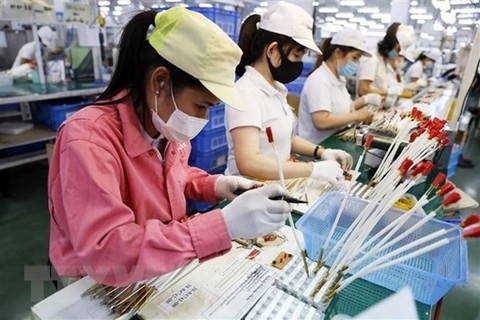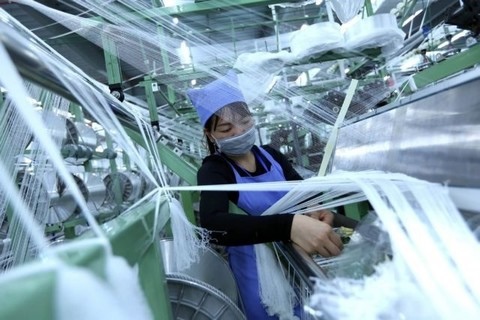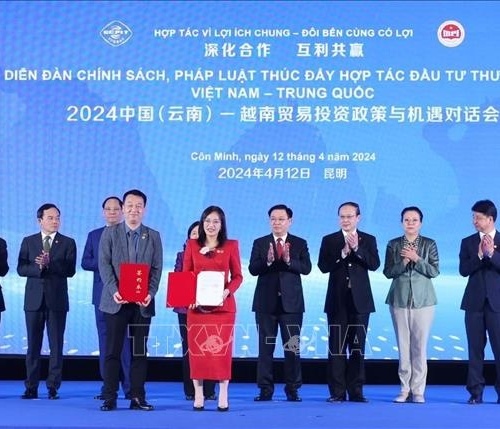Impressive Q2 growth, but risks still abound
Impressive Q2 growth, but risks still abound
Viet Nam’s economy maintained impressive growth in the second quarter this year, but risks are becoming more apparent, especially threats on the exchange rate and interest rate.

The statement was made by Nguyen Duc Thanh, director of Viet Nam Institute for Economic and Policy Research (VEPR) at a conference held in Ha Noi on Wednesday.
“The impact of the US-China trade war has made the value of the Chinese yuan (CNY), fall sharply against the US dollar. Viet Nam cannot refrain from adjusting its exchange rate, thus creating a risk for the enterprises,” Thanh told Viet Nam News.
Vietnamese inflation is starting to increase slightly; therefore, the State Bank of Viet Nam (SBV) needs to control inflation to not exceed five per cent.
With many large central banks tightening currency, together with the risk of high inflation in the near term, the SBV may raise interest rates for the dong to stabilise the exchange rate, Thanh added.
Such findings from a macroeconomic report released yesterday by VEPR showed that the economy in Q2 saw growth rate of 6.79 per cent year-on-year, the highest in ten years.
According to VEPR’s report, the agriculture, forestry, fishery and service sectors continued to improve sharply. The industry and construction sector also grew at a high rate of 9.07 per cent in the first half of the year.
Manufacturing continued to drive the economy, while the mining industry fell back to decline, reflecting the seasonal characteristic of the positive growth in Q1.
Inflation surged in Q2, reaching 4.67 per cent at the end of June, due to rising food and fuel prices. Meanwhile, core inflation remained at 1.37 per cent, reflecting the SBV’s prudent monetary policy.
Trade growth slowed in the second quarter of this year; meanwhile trade balance recorded a surplus in the fourth consecutive quarter and reached US$1.4 billion in Q2. Notably, China regained its position as the country with the highest trade deficit among Viet Nam’s trading partners.
One noteworthy point in the VEPR study was that the number of temporarily ceased enterprises was abnormally high, while the number of new jobs declined.
Speaking at the report announcement, economist Pham Chi Lan raised concerns about the decrease in employment rate due to the remarkable rise of shuttered firms. In other countries such as the US, Europe or Japan, the employment rate was always a top priority, however, unemployment in Viet Nam had not received sufficient concern from authorities, Lan said.
VEPR’s statistics also showed that Viet Nam’s budget balance returned to a deficit in Q2, after a temporary surplus in Q1. Recurrent expenditures continued to be higher than 70 per cent of total expenditures, while development investment expenditures had not improved much.
In the second quarter, the country’s total retail sales of goods and services increased in value but declined in volume over the same period last year, reflecting a recovery trend in prices in 2018.
The report said that investment growth in the private sector was strongest in all economic sectors. Meanwhile, newly registered foreign direct investment capital in Q2 reached a record level. Japan was the top investor in Viet Nam in the first six months of 2018.
The liquidity of the system was abundant due to the higher deposit growth than credit growth, coupled with foreign currency purchases by the SBV. Foreign exchange reserves continued to rise, reaching $63.5 billion at the end of Q2, the same level as the International Monetary Fund’s recommendation.
Another notable point from the report was that the real estate market in Q2 declined in both Ha Noi and HCM City, both in new apartments for sale and transactions.
Economist Pham The Anh attributed the gloomy real estate sector to some factors such as the slow growth of the economy, instabilities in exchange rate, consumer price index and the tension between the US and China.
“The potential risk of an increase in interest rates in the near future could also push the real estate market down,” he told Viet Nam News.
VEPR’s report forecast that this year’s GDP growth target might clock in at 6.8 per cent, higher than the 6.5 to 6.7 per cent goal set by the National Assembly, as it forecast economic growth rates for the upcoming quarters to reach 6.65 and 6.55 per cent, respectively.
The Viet Nam Annual Economic Report, published by VEPR, is a series of annual reports summarising major economic issues in the previous year, giving an outlook for the coming year and providing policy recommendations.
The quarterly report was completed by the VEPR with support from the Konrad Adenauer Stiftung.










